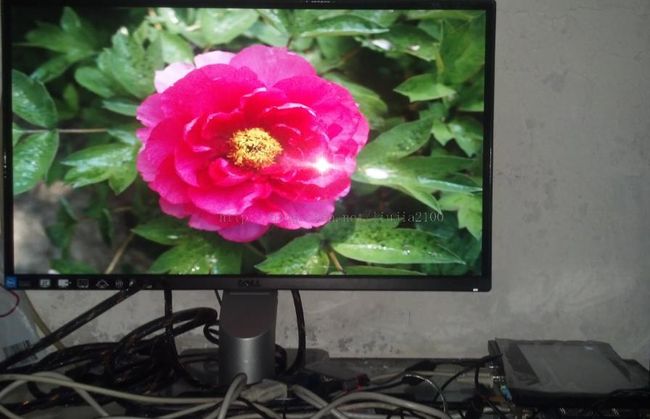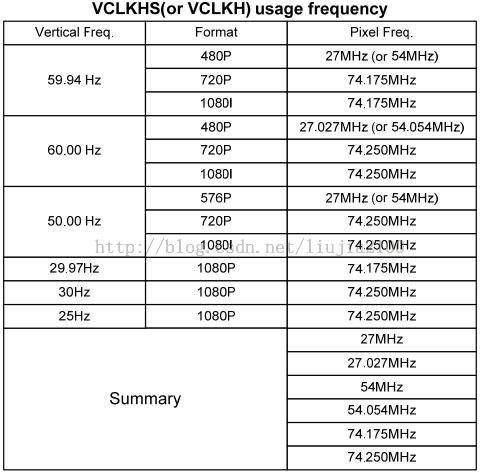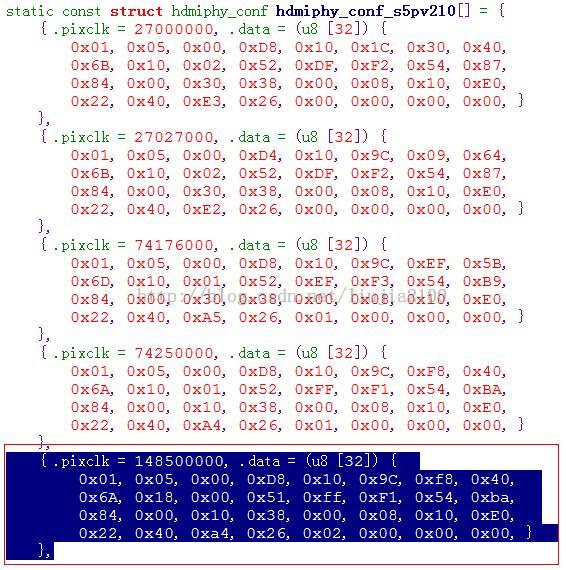s5pv210 HDMI 1080P 高清显示
s5pv210 HDMI 1920x1080P@60Hz 显示 高清图片
s5pv210 可以设置成1920x1080P@60Hz显示,虽然datasheet并没有提供这种配置,因为1080P@60hz,需要 148500000的Pixel Clock,但是datasheet给出最高的是74250000。
在hdmiphy_drv.c 添加148500000的clock配置(linux3.9.7)
这个数据最终会通过调用 hdmiphy_s_dv_preset函数,hdmi的专用i2c,写入的hdmi模块中
static int hdmiphy_s_dv_preset(struct v4l2_subdev *sd,
struct v4l2_dv_preset *preset)
{
const u8 *data;
u8 buffer[32];
int ret;
struct hdmiphy_ctx *ctx = sd_to_ctx(sd);
struct i2c_client *client = v4l2_get_subdevdata(sd);
struct device *dev = &client->dev;
dev_info(dev, "s_dv_preset(preset = %d)\n", preset->preset);
data = hdmiphy_find_conf(preset->preset, ctx->conf_tab);
if (!data) {
dev_err(dev, "format not supported\n");
return -EINVAL;
}
/* storing configuration to the device */
memcpy(buffer, data, 32);
ret = i2c_master_send(client, buffer, 32);
if (ret != 32) {
dev_err(dev, "failed to configure HDMIPHY via I2C\n");
return -EIO;
}
return 0;
}
测试源码(自己可以制作1080P的bmp图片)
#include <errno.h>
#include <fcntl.h>
#include <linux/videodev2.h>
#include <math.h>
#include <stdio.h>
#include <stdint.h>
#include <stdlib.h>
#include <string.h>
#include <sys/ioctl.h>
#include <sys/mman.h>
#include <sys/stat.h>
#include <sys/types.h>
#define ERRSTR strerror(errno)
#define debug
#define BYE_ON(cond, ...) \
do { \
if (cond) { \
int errsv = errno; \
fprintf(stderr, "ERROR(%s:%d) : ", \
__FILE__, __LINE__); \
errno = errsv; \
fprintf(stderr, __VA_ARGS__); \
abort(); \
} \
} while(0)
#define ReqButNum 3
//#define HDMI480P
//#define HDMI720P
#define HDMI1080P
#ifdef HDMI480P
#define hdmi_width 720
#define hdmi_height 480
#endif
#ifdef HDMI720P
#define hdmi_width 1280
#define hdmi_height 720
#endif
#ifdef HDMI1080P
#define hdmi_width 1920
#define hdmi_height 1080
#endif
#define CLEAR(x) memset(&(x), 0, sizeof(x))
#define BYE_ON(cond, ...) \
do { \
if (cond) { \
int errsv = errno; \
fprintf(stderr, "ERROR(%s:%d) : ", \
__FILE__, __LINE__); \
errno = errsv; \
fprintf(stderr, __VA_ARGS__); \
abort(); \
} \
} while(0)
struct hdmibuffer {
int index;
void *data;
size_t size;
size_t width;
size_t height;
/* buffer state */
double t;
};
struct hdmibuffer hdmi_buffer[ReqButNum];
struct buffer {
int index;
void *data;
size_t size;
size_t width;
size_t height;
/* buffer state */
double t;
};
struct context {
int fd;
struct hdmibuffer *buffer;
size_t buffer_cnt;
};
char hdmi_path[] = "/dev/video10";
static int hdmi_fd;
int open_hdmi_device()
{
int fd;
if((fd = open(hdmi_path,O_RDWR)) < 0)
{
perror("Fail to open");
exit(EXIT_FAILURE);
}
hdmi_fd = fd;
printf("open hdmi success %d\n",fd);
return fd;
}
int hdmi_setfmt()
{
int ret;
/* configure desired image size */
struct v4l2_format fmt;
struct v4l2_fmtdesc fmtdesc;
memset(&fmtdesc,0,sizeof(fmtdesc));
fmtdesc.index = 0;
fmtdesc.type = V4L2_BUF_TYPE_VIDEO_OUTPUT_MPLANE;
while((ret = ioctl(hdmi_fd,VIDIOC_ENUM_FMT,&fmtdesc)) == 0)
{
fmtdesc.index ++ ;
printf("{pixelformat = %c%c%c%c},description = '%s'\n",
fmtdesc.pixelformat & 0xff,(fmtdesc.pixelformat >> 8)&0xff,
(fmtdesc.pixelformat >> 16) & 0xff,(fmtdesc.pixelformat >> 24)&0xff,
fmtdesc.description);
}
memset(&fmt,0,sizeof(fmt));
fmt.type = V4L2_BUF_TYPE_VIDEO_OUTPUT_MPLANE;
fmt.fmt.pix.width = hdmi_width;
fmt.fmt.pix.height = hdmi_height;
fmt.fmt.pix.field = V4L2_FIELD_INTERLACED;
//V4L2_FIELD_NONE;
//V4L2_FIELD_INTERLACED;
printf("%s: +\n", __func__);
/* format is hardcoded: draw procedures work only in 32-bit mode */
fmt.fmt.pix.pixelformat = V4L2_PIX_FMT_BGR32;
ret = ioctl(hdmi_fd, VIDIOC_S_FMT, &fmt);
BYE_ON(ret < 0, "VIDIOC_S_FMT failed: %s\n", ERRSTR);
/* update format struct to values adjusted by a driver */
ret = ioctl(hdmi_fd, VIDIOC_G_FMT, &fmt);
BYE_ON(ret < 0, "VIDIOC_G_FMT failed: %s\n", ERRSTR);
printf("getfmt:%d,%d\n", fmt.fmt.pix.width, fmt.fmt.pix.height);
BYE_ON((fmt.fmt.pix.width < hdmi_width) | (fmt.fmt.pix.height < hdmi_height), "VIDIOC_G_FMT failed: %s\n", ERRSTR);
/* crop output area on display */
struct v4l2_crop crop;
crop.type = V4L2_BUF_TYPE_VIDEO_OUTPUT;
crop.c.left = 0;
crop.c.top = 0;
crop.c.width = hdmi_width;
crop.c.height = hdmi_height;
ret = ioctl(hdmi_fd, VIDIOC_S_CROP, &crop);
BYE_ON(ret < 0, "VIDIOC_S_CROP failed: %s\n", ERRSTR);
printf("%s: -\n", __func__);
return 0;
}
int hdmi_reqbufs()
{
int ret;
int i,j;
struct v4l2_requestbuffers rqbufs;
struct v4l2_plane plane;
struct v4l2_buffer buf;
struct v4l2_format fmt;
rqbufs.count = ReqButNum;
rqbufs.type = V4L2_BUF_TYPE_VIDEO_OUTPUT_MPLANE;
rqbufs.memory = V4L2_MEMORY_MMAP;
printf("%s +\n", __func__);
ret = ioctl(hdmi_fd, VIDIOC_REQBUFS, &rqbufs);
printf("reqbuf:%d\n", rqbufs.count);
BYE_ON(ret < 0, "VIDIOC_REQBUFS failed: %s\n", ERRSTR);
BYE_ON(rqbufs.count < ReqButNum, "failed to get %d buffers\n", ReqButNum);
// ret = ioctl(hdmi_fd, VIDIOC_G_FMT, &fmt);
// BYE_ON(ret < 0, "VIDIOC_G_FMT failed: %s\n", ERRSTR);
/* buffers initalization */
for (i = 0; i < ReqButNum; ++i) {
buf.index = i;
buf.type = V4L2_BUF_TYPE_VIDEO_OUTPUT_MPLANE;
buf.memory = V4L2_MEMORY_MMAP;
buf.m.planes = &plane;
buf.length = 1;
/* get buffer properties from a driver */
ret = ioctl(hdmi_fd, VIDIOC_QUERYBUF, &buf);
BYE_ON(ret < 0, "VIDIOC_QUERYBUF for buffer %d failed: %s\n",
buf.index, ERRSTR);
hdmi_buffer[i].index = i;
/* mmap buffer to user space */
hdmi_buffer[i].data = mmap(NULL, plane.length, PROT_READ | PROT_WRITE,
MAP_SHARED, hdmi_fd, plane.m.mem_offset);
BYE_ON(hdmi_buffer[i].data == MAP_FAILED, "mmap failed: %s\n",
ERRSTR);
hdmi_buffer[i].size = plane.length;
hdmi_buffer[i].width = hdmi_width;
hdmi_buffer[i].height = hdmi_height;
/* fill buffer with black */
for (j = 0; 4 * j < hdmi_buffer[i].size; ++j)
((unsigned int *)hdmi_buffer[i].data)[j] = 0xff000000;
}
printf("%s -\n", __func__);
return 0;
}
int init_device()
{
hdmi_setfmt();
hdmi_reqbufs();
printf("%s -\n", __func__);
}
int hdmi_streamon()
{
enum v4l2_buf_type type;
int ret;
// hdmi_qbuf(2);
struct timeval tv;
gettimeofday(&tv, NULL);
type = V4L2_BUF_TYPE_VIDEO_OUTPUT_MPLANE;
ret = ioctl(hdmi_fd, VIDIOC_STREAMON, &type);
BYE_ON(ret, "VIDIOC_STREAMON failed: %s\n", ERRSTR);
return 0;
}
int hdmi_qbuf(int index)
{
struct v4l2_buffer buf;
struct v4l2_plane plane;
debug("queue +\n");
memset(&buf, 0, sizeof(buf));
memset(&plane, 0, sizeof(plane));
buf.type = V4L2_BUF_TYPE_VIDEO_OUTPUT_MPLANE;
buf.index = index;
buf.memory = V4L2_MEMORY_MMAP;
buf.m.planes = &plane;
buf.length = 1;
int ret;
ret = ioctl(hdmi_fd, VIDIOC_QBUF, &buf);
BYE_ON(ret, "VIDIOC_QBUF(index = %d) failed: %s\n",
index, ERRSTR);
//sem_post(&lcd_sem);
return 0;
}
int hdmi_dbuf(int *index)
{
int ret;
struct v4l2_buffer buf;
struct v4l2_plane plane;
debug("dequeue +\n");
memset(&buf, 0, sizeof(buf));
buf.type = V4L2_BUF_TYPE_VIDEO_OUTPUT_MPLANE;
buf.memory = V4L2_MEMORY_MMAP;
buf.m.planes = &plane;
buf.length = 1;
ret = ioctl(hdmi_fd, VIDIOC_DQBUF, &buf);
BYE_ON(ret, "VIDIOC_DQBUF failed: %s\n", ERRSTR);
*index = buf.index;
return 0;
}
unsigned int *display_bmp_image()
{
unsigned int *img_buf;
FILE *fp;
int count = 0, i = 0, j=0, r, g, b;
char ch;
char *pch;
int buf_size = hdmi_width * hdmi_height;
img_buf = (unsigned int *)malloc(buf_size * sizeof(int));
memset(img_buf, 0, sizeof(img_buf));
if(NULL == (fp = fopen("./test.bmp", "r")))
{
printf("open the image file %s failed!\n", "test.bmp");
return;
}
for(i = 0 ; i < 54 ; i++)
ch=fgetc(fp);
for(i = 0; i < hdmi_height; i++)
{
for(j = 0; j < hdmi_width; j++)
{
r = fgetc(fp);
g = fgetc(fp);
b = fgetc(fp);
img_buf[(hdmi_height - i - 1) * hdmi_width + j] = (unsigned int)(0xff000000 | (b << 16) | (g << 8) | r);
}
}
fclose(fp);
return (void *)img_buf;
}
int main()
{
int static i = 0;
int j = 0;
int k = 0;
int r, g, b;
unsigned int *bmp_buf;
bmp_buf = display_bmp_image();
open_hdmi_device();
hdmi_setfmt();
hdmi_reqbufs();
hdmi_qbuf(0);
hdmi_qbuf(1);
hdmi_qbuf(2);
hdmi_streamon();
while(1)
{
hdmi_dbuf(&i);
k = (k + 8)%24;
printf("i=%d, %lx\n",i, 0xff000000 | (0xff << k));
memcpy((void *)hdmi_buffer[i].data, (void *)bmp_buf, hdmi_width * hdmi_height * 4);
hdmi_qbuf(i);
getchar();
for(j = 0; j < hdmi_width * hdmi_height; j ++)
((unsigned int *)hdmi_buffer[i].data)[j] = 0xff000000 | (0xff << k);
}
}
通过测试,发现
只能运行逐行扫描模式,即1080P,720P,480P,不能运行隔行扫描,即1080i,
提示错误:
[ 31.609709] s5p-mixer s5p-mixer: no vsync detected - timeout [ 31.609758] ------------[ cut here ]------------ [ 31.609817] WARNING: at drivers/media/platform/s5p-tv/mixer_drv.c:83 mxr_streamer_get+0x148/0x1c4() [ 31.609887] failed to get vsync (-62) from output [ 31.611366] Modules linked in: [ 31.614429] [<c0018d30>] (unwind_backtrace+0x0/0xf0) from [<c0023158>] (warn_slowpath_common+0x4c/0x68) [ 31.623787] [<c0023158>] (warn_slowpath_common+0x4c/0x68) from [<c0023208>] (warn_slowpath_fmt+0x30/0x40) [ 31.633314] [<c0023208>] (warn_slowpath_fmt+0x30/0x40) from [<c0318a44>] (mxr_streamer_get+0x148/0x1c4) [ 31.642672] [<c0318a44>] (mxr_streamer_get+0x148/0x1c4) from [<c03191d4>] (start_streaming+0x80/0xb0) [ 31.651858] [<c03191d4>] (start_streaming+0x80/0xb0) from [<c02f5d44>] (vb2_streamon+0x74/0x160) [ 31.660616] [<c02f5d44>] (vb2_streamon+0x74/0x160) from [<c02e3ff8>] (v4l_streamon+0x18/0x1c) [ 31.669103] [<c02e3ff8>] (v4l_streamon+0x18/0x1c) from [<c02e671c>] (__video_do_ioctl+0x25c/0x33c) [ 31.678027] [<c02e671c>] (__video_do_ioctl+0x25c/0x33c) from [<c02e7938>] (video_usercopy+0xac/0x3f4) [ 31.687212] [<c02e7938>] (video_usercopy+0xac/0x3f4) from [<c02e2774>] (v4l2_ioctl+0xe0/0x144) [ 31.695802] [<c02e2774>] (v4l2_ioctl+0xe0/0x144) from [<c00bae44>] (do_vfs_ioctl+0x80/0x618) [ 31.704199] [<c00bae44>] (do_vfs_ioctl+0x80/0x618) from [<c00bb418>] (sys_ioctl+0x3c/0x60) [ 31.712437] [<c00bb418>] (sys_ioctl+0x3c/0x60) from [<c0013940>] (ret_fast_syscall+0x0/0x30) [ 31.720829] ---[ end trace f6f0c2e97ef6ff7e ]---
DELL S2340L显示器只能配置到1080P@60HZ, 不能显示50HZ和30HZ,所以只能配置到60Hz,在运行动画时,刷屏有点闪烁,以后在分析


